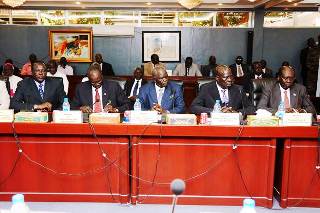New S. Sudan finance minister vows to raise 90m SSP in 100 days
August 9, 2013 (JUBA)- South Sudan’s new finance minister, Aggrey Tisa Sabuni, has pledged to raise non-oil revenues from 70 to 90 million South Sudanese pounds (SSP) within 100 days of taking office.

Sabuni, who appeared relaxed and happy, held several high-level positions at the ministry before being appointed presidential advisor on economic affairs.
The official, who served as the under-secretary at the same ministry prior to his appointment into an advisory position in 2012, said he would continue with the economic reforms which his predecessor had put in place.
“Drive on economic reforms will continue. Reductions in non-essential expenditures across the board will remain in place on items such as travel, vehicles and supplies. At the same time the drive to improve our payroll procedures and improve accountability will continue, by ensuring that only workers who are working get paid. These cuts, though painful, are crucial to ensure that we have sufficient funds to maintain security and provide basic service during this difficult period”, he said.
Sabuni also reaffirmed president Salva Kiir Mayardit’s commitment to ensure that tax revenue is utilised efficiently and transparently to improve the lives of ordinary South Sudanese people.
“The government under the leadership of our president Salva Kiir Mayardit, will continue to deepen tax reforms and modernisation in order to eliminate wastage and corruption. We will work together with the relevant institutions to ensure proper implementation of the public financial management act and also ensure that [the] procurement bill is passed to enhance transparency and accountability, Sabuni told reporters Friday.
He said that under his leadership, the ministry would work on simplifying the tax system, making it easier to comply with and more efficient in promoting domestic investment, foreign direct investment and employment creation.
“The objective of these economic reforms is basically to improve the system and to raise resources for funding government operations without excessive borrowing and contribute to equitable distribution of income”, he said.
He said the government would also continue to ensure that resources are allocated in accordance with priority targets, including infrastructure development, expansion of education and health facilities and creation of a conducive environment for private sector development and employment creation.
He urged all citizens to pay taxes as required in order for the country to maintain its economic independence and realise sufficient funds for public programmes that would help improve the welfare of all South Sudanese people.
“If proper procedures are followed as they are laid down as part of the general economic policies, I am certain we will realise vision objectives of transforming South Sudan into a globally competitive middle income economy with high a quality of life for all citizens”, he said.
(ST)
